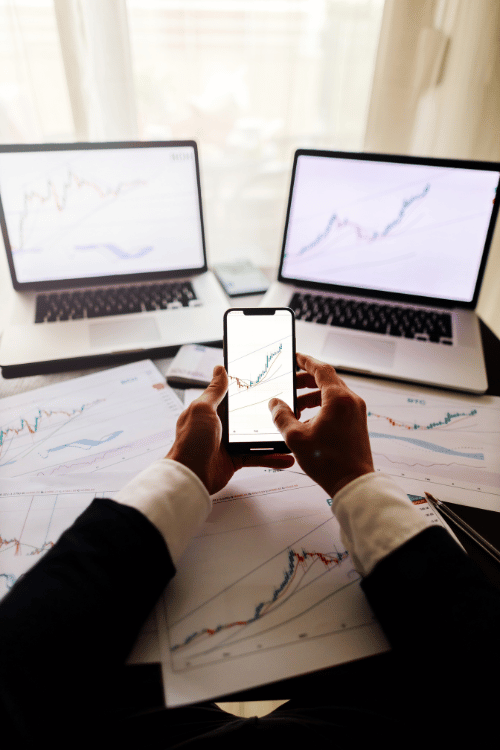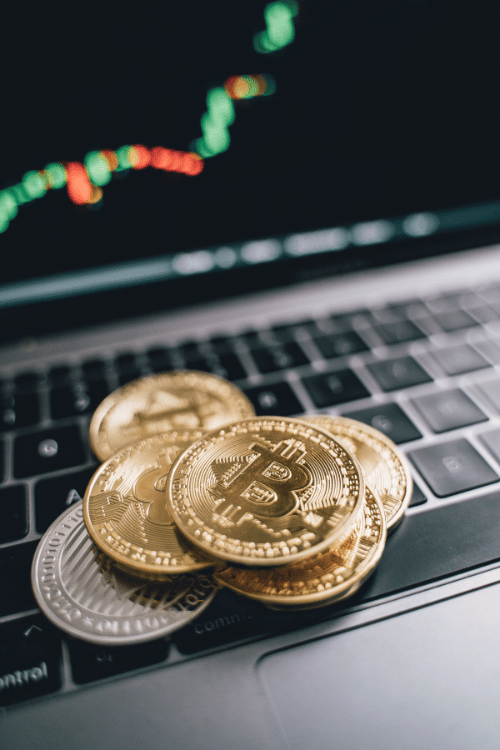Trading Tips
How to master Trading Psychology?
Imagine you’re in the heat of a trade, watching the market’s rapid movements with a mix of excitement and anxiety.
This scenario is familiar to traders of all levels. At the core of these emotions lies trading psychology : How our mindset and emotions influence decisions ? Follow the guide!
Introduction
Introduction to Trading Psychology
While mastering technical analysis and strategy is important, the psychological aspect often separates consistent winners from those who struggle.
Trading psychology tips plays a key role in maintaining discipline, managing emotions, and ultimately, achieving success in trading.

Challenges
Trading key psychological challenges: Fear, greed and overconfidence
Emotions such as fear, greed, impatience and overconfidence are constant companions in the trading journey. Fear often manifests as hesitation or premature exits, driven by the worry of losing money.
Conversely, greed pushes traders to chase profits, leading to over-leveraging and holding positions longer than advisable. Impatience can lead to hasty decisions, jumping into trades without proper analysis, often resulting in losses. Overconfidence, especially after a streak of wins, can lure traders into ignoring their rules, taking on excessive risk.
Understanding these emotional triggers is the first step in managing them. Recognising when fear or greed is influencing your decisions allows you to take a step back, reassess, and make more rational choices.
Once you start your new career at Challenge4trading.com and become a funded trader, you’ll get access to the Sirix trading platform that offers a modern, user-friendly interface to assist you in your trading strategy. With Sirix, you can follow top traders, observe their strategies, and even replicate their trades with just a few clicks. It’s the perfect way to learn from the best and enhance your own trading approach. Accessible from computers, cell phones and tablets, Sirix facilitates access to the financial markets for C4T traders of all levels, and integrates advanced analysis tools for a complete and intuitive trading experience.
Day trading psychology : How to overcome fear in fast markets?
Day trading is an arena of high intensity, where decisions need to be made within seconds. The psychological pressure can be immense, with constant market movements testing your emotional resilience. Preparation is key; starting your day with a clear plan can help maintain focus amid the chaos. Establishing a trading routine for beginners that includes reviewing key news, setting up your trading environment, and visualising your goals can set the tone for a disciplined day.
Emotional detachment is vital. Viewing each trade independently helps maintain objectivity. If a trade goes against you, it’s easy to get caught up in the heat of the moment. Stepping back, reassessing calmly, and sticking to your predefined plan are crucial strategies for staying composed.
Practical tips to master trading psychology
Mastering trading psychology involves refining your mental approach and making conscious adjustments to how you think and behave while trading.
We advised you to give strong attention to the following psychology tips that will help you stay disciplined and emotionally balanced once joining our prop firm challenge platform:
✅ Practice patience: Waiting for the right trade setups rather than chasing every movement helps you stay focused and reduces impulsive decisions. Patience is critical for maintaining a clear head in volatile markets.
✅ Create a calm trading environment: Your physical environment affects your mindset. A clutter-free and quiet workspace enhances concentration and reduces stress, allowing you to make more calculated decisions. Ensure your setup is comfortable and free from distractions.
✅ Manage emotions with techniques: Emotional control is not about suppressing feelings but learning to manage them. Incorporate techniques like:
✅ Deep breathing: Helps calm your nerves during tense trading moments.
✅ Mindfulness and meditation: Regular mindfulness practice enhances focus and keeps you grounded, even during market turbulence.
✅ Step away from the screen: If feeling overwhelmed, take short breaks to reset your mind. A quick walk or a moment of quiet reflection can prevent hasty trading decisions.
✅ Set realistic goals: Unrealistic expectations can lead to disappointment and emotional trading. Define achievable short-term and long-term goals that align with your strategy and risk tolerance.
✅ Journaling and self-reflection: Keeping a trading journal where you record trades, thoughts, and emotional responses helps identify patterns in your behavior. Reviewing these entries regularly allows you to learn from mistakes and refine your psychological approach.
✅ Establish routine check-ins: Regularly assess your mental and emotional state throughout your trading day. Quick self-check-ins help you stay aware of how your emotions are impacting your decisions.
✅ Use visual reminders: Place reminders or motivational quotes in your trading space that encourage discipline and remind you of your goals and rules. These visual cues can help keep your mindset aligned with your strategy.
Mastering trading psychology is a continuous process. By integrating these practical tips into your daily routine, you can develop a more disciplined, emotionally balanced approach to trading, ultimately leading to more consistent and rational trading decisions that will be instrumental for taking part in prop firm challenges !

Mindset
Trading psychology: How to develop a trader mindset and think like a pro ?
A successful trader mindset is built on discipline, emotional control, and continuous learning. Setting clear goals and rules is critical: knowing what you want to achieve and the boundaries you won’t cross helps you stay focused. Losses should be viewed not as failures but as learning opportunities.
Every trader, from beginners to seasoned professionals, faces losses. The difference lies in how you respond !
Continuous education is key, and that’s where our trading academy
comes in. Designed to enhance your trading skills and adaptability, our academy offers insights into ever-changing market dynamics. We provide resources to help you refine your strategies, stay ahead of new developments, and
build the mental resilience needed to thrive in volatile conditions.
Markets evolve rapidly, and so should your approach—our academy equips you to face these challenges with confidence and skill.
Crypto trading psychology : Navigating the Wild West of markets
Crypto markets are notoriously volatile, testing even the most seasoned traders. The psychological landscape of crypto trading often includes grappling with the fear of missing out (FOMO) and dealing with sharp price swings. It’s easy to get swept up in the hype when prices soar, leading to impulsive decisions that can quickly backfire.
The key to managing these pressures is to have a well-defined strategy before entering the market. Set clear entry and exit points and resist the urge to make decisions based on short-term market fluctuations. Checking prices too frequently can heighten anxiety, so establish specific times to review the market and stick to them.
Forex trading psychology : Naming the world’s largest market
Forex trading comes with its own set of psychological challenges, particularly because of the high leverage involved. The appeal of significant profits can easily turn into a double-edged sword, amplifying losses just as quickly. To navigate this, traders must have a disciplined approach to leverage, using it wisely and within their risk tolerance.
Staying patient and focusing on the process rather than the outcome helps keep emotions in check. Successful forex trading often requires waiting for the perfect setup, even if that means sitting on the sidelines. This patience ensures that trades are made with purpose and clarity, rather than out of impatience or boredom raising building your Forex trading skills gradually.
Master trading psychology : A continuous journey
Mastering trading psychology isn’t an overnight achievement—it’s a continuous journey of self-awareness and improvement. Cultivating self-awareness is crucial; by regularly evaluating your emotional state, you can identify patterns that affect your trading. Are you trading out of frustration after a loss? Or are you overconfident after a winning streak?
Recognising these states allows you to adjust your approach before emotions take control.
Setting realistic expectations also plays a pivotal role. Trading is not a get-rich-quick scheme; it requires dedication, strategy, and resilience. Celebrating small successes and learning from setbacks fosters a growth mindset, helping you stay motivated and focused on long-term progress.
Resilience
Building long-term psychological resilience: Beyond short-term gains
Resilience in trading is built over time through experience, reflection, and adaptability. Developing a post-trade analysis routine helps you understand not just what went right or wrong, but why.
This reflection helps refine your strategy and strengthens your mental fortitude. Having a support system, whether through trading communities, forums, or mentors, can also be incredibly beneficial. These networks provide a space to share experiences, gain new perspectives, and receive emotional support during tough times.
Maintaining physical and mental well-being is just as important as honing your trading skills. Regular exercise, proper nutrition, and adequate rest contribute to clearer thinking and better decision-making.
A healthy body supports a healthy mind, which in turn supports successful trading.

Practical tips for staying calm amid alarming economic news
Economic news can create a sense of urgency and fear, which often leads to impulsive trading decisions. Here are some practical tips to help maintain perspective and stay calm during turbulent times:
1. Limit your exposure to news
Constantly consuming news can heighten anxiety. Instead of keeping an eye on every headline, set specific times to catch up on relevant economic updates. Use reputable sources to avoid sensationalism, which can exaggerate the impact of events.
2. Stick to your trading plan
When economic news breaks, it’s tempting to make spur-of-the-moment decisions. However, it’s crucial to stick to your trading plan. This means relying on your analysis and strategy rather than reacting emotionally. A well-defined plan acts as your anchor during uncertain times.
3. Use Risk Management tools
Tools such as the following:
- – Stop-loss orders: These help cap potential losses and allow you to manage trades automatically.
- – Position sizing: Adjusting your position size based on the volatility or potential impact of news helps reduce risk exposure.
- – Hedging strategies: Diversifying your portfolio or using hedging techniques can mitigate risks associated with market swings.
4. Keeps perspective
Economic downturns and crises are part of the market’s natural cycle. Use these moments as opportunities to evaluate your strategy and find new ways to adapt rather than seeing them solely as threats. Remember that every downturn has historically been followed by recovery.
5. Engage in stress-reducing activities
Incorporate stress-reducing techniques into your routine, such as exercise, meditation, or hobbies that take your mind off trading. Balancing your time with other fulfilling activities helps maintain mental clarity and emotional balance.
6. Avoid groupthink and panic selling
Groupthink occurs when traders follow the actions of others, often out of fear of missing out or simply because it feels safer to follow the crowd. This behavior can lead to panic selling during market downturns, where traders abandon their strategies and sell assets impulsively, driven by the herd’s fear rather than rational analysis.
Therefore, it’s crucial to develop independent thinking. Base your decisions on personal research and your trading plan, not on market sentiment or social media buzz. Recognising the signs of groupthink can help you stay disciplined, make informed decisions, and resist the emotional pull of the crowd. By focusing on your long-term strategy and tuning out market noise, you can maintain control and avoid costly mistakes driven by panic.
Trading psychology books: Must-reads to shape your mindset
1. Trading book: “Trading in the Zone” by Mark Douglas
Books on trading psychology offer profound insights that can transform your trading mindset. One standout is “Trading in the Zone” by Mark Douglas, which delves deep into the mental barriers traders face, such as fear and overconfidence, and offers actionable strategies to overcome them. Douglas argues that successful trading is about consistency, and his advice on approaching the market with a clear, unbiased mindset is invaluable.
2. Trading book: “The Daily Trading Coach” by Brett Steenbarger
Another essential read is “The Daily Trading Coach” by Brett Steenbarger. Steenbarger’s work goes beyond theory, providing 101 lessons that are practical and easy to implement. Each lesson is designed to help traders improve their mental resilience, whether it’s through stress management techniques or exercises to enhance decision-making skills.
3. Trading book: “Mind Over Markets” by James Dalton
“Mind Over Markets” is another must-read, particularly for those interested in understanding market dynamics. While it focuses on market profile trading, its insights into trader behaviour and psychological patterns are applicable across various trading styles. Dalton encourages readers to think critically about market movements, helping them to avoid impulsive, emotionally-driven trades.
4. Trading book: “Enhancing Trader Performance” by Brett Steenbarger
For those looking to deepen their understanding of performance psychology, “Enhancing Trader Performance” by Brett Steenbarger explores the links between mental state and trading success. Steenbarger’s focus on building a performance-driven mindset resonates deeply with traders striving for excellence.
5. Trading book: “The Disciplined Trader” by Mark Douglas
Lastly, “The Disciplined Trader” by Mark Douglas offers a foundational perspective on the complex relationship between emotions and trading. Douglas provides a thorough analysis of psychological pitfalls, making it an essential guide for any trader seeking to better understand their mental processes.
As you now realize, navigating the complex world of trading requires more than just technical skills—it demands a deep understanding of your own psychology.
By mastering emotions, maintaining discipline, and continually refining your approach, you can turn the market’s challenges into opportunities. The journey of mastering trading psychology is ongoing, but with the right mindset and strategies, success is well within reach.
